
First Intermissions: Twenty-One Great Operas Explored, Explained, and Brought to Life From the Met PDF
265 Pages·1996·12.65 MB·English
Most books are stored in the elastic cloud where traffic is expensive. For this reason, we have a limit on daily download.
Preview First Intermissions: Twenty-One Great Operas Explored, Explained, and Brought to Life From the Met
Description:
Millions of opera fans tune in faithfully to the Metropolitan Opera's famous Saturday radio series. One of the program's highlights occurs during the first intermission, when invited speakers offer live, stimulating commentary on the opera aired that day. And for the last twelve years one of the most popular guests on this program has been M. Owen Lee, a Catholic priest and classics scholar, who has emerged as a brilliant and engaging speaker with a gift for making opera relevant to modern concerns. Now, in First Intermissions, Father Lee presents twenty-one of his finest radio talks, analyzing some of the best loved operas in the current repertoire, including masterworks by Mozart, Verdi, Wagner, Puccini, and Strauss. This is a book that brims with opera lore, with the love of fine music, and with an abundance of good humor. Father Lee writes brilliantly about the music itself, offering insights into composition that even a novice can grasp and enjoy. But for Father Lee, opera is more than beautiful music. Opera is about the human condition, our capacity for good and evil, our unconscious thoughts and conscious actions, our sorrows and our joys, our stories, our myths, and our personal triumphs and tragedies. It is great art confronting life head on: the conflict between fathers and children in Verdi, the irreversibility of time in Strauss, or the quest for self-realization in Wagner. Father Lee brings the real story of opera to life--great stories that make us see beyond the plot and feel the music as a blow to the heart. What also strikes the reader about Father Lee's style is that it is very intimate, not only sprinkled with personal anecdotes (such as saving pennies in Depression-era Detroit to buy sheet music from Sears and Roebuck), but informed throughout by his open-hearted response to opera's magic. Father Lee's love of opera shines through these pieces, and his enthusiasm is contagious, sending readers straight to their record collections--or the nearest record store--to savor once again the marvels of opera. When Father Owen Lee first appeared on the Metropolitan Opera broadcasts, he was given two criteria. "I could say anything I pleased," he recalls, "so long as (1) it was instantly intelligible to the little old lady in Dubuque and the little old gentleman in Des Moines and (2) it was something no one anywhere, of either sex or any age, had ever thought of before." Whether discussing Puccini's La Boheme or Strauss's Der Rosenkavalier or Gounod's Faust, Father Lee remains utterly original and always in touch with the little old lady in Dubuque.
See more
The list of books you might like
Most books are stored in the elastic cloud where traffic is expensive. For this reason, we have a limit on daily download.
